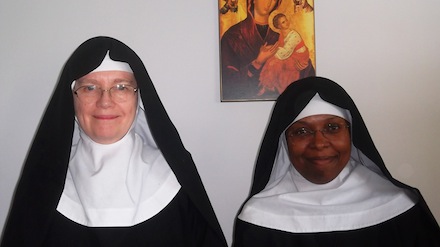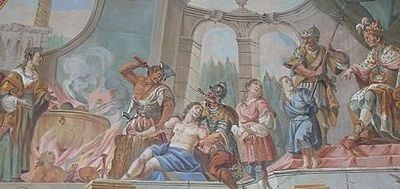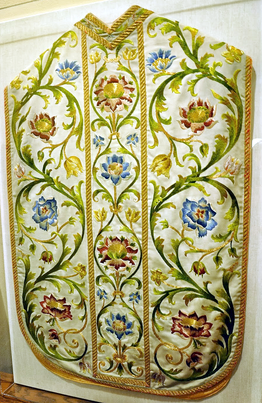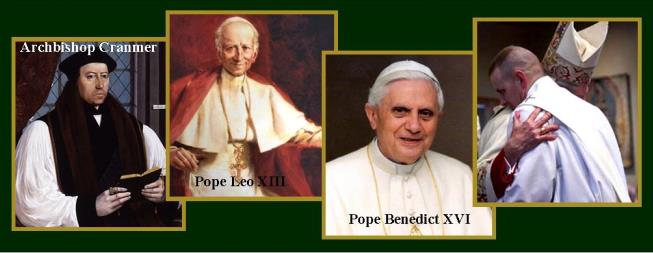Sunday per annum 33rd
C
It
was Herod the Great who had begun to renovate and expand the
Jerusalem Temple in 19 BC. We know that the structure was immense and
that some of the stones in it measured 12 metres in length. So the
impression the building gave was of great solidity and permanence.
Something which people would have appreciated especially given they
were currently occupied by the Romans. It is not too different to
people today visiting a Gothic cathedral or abbey, and remarking on
its impressiveness. In the gospel, as the people were commenting on
the Temple's immensity and impressiveness, Jesus responded by saying
that this is all an illusion, for the day would come when it would be
torn down.
A
generation later our Lord's words would be proved true. In AD70 the
Romans trampled the city of Jerusalem to dust, including the complete
destruction of the Jewish Temple. No more could the practice of the
Jewish religion be centred on the Temple.
Our
Lord is clearly aware in this gospel passage that His disciples
(including you and I) can be easily impressed and He warns us against
being led astray. We can be led astray by the impressiveness of human
achievement, like those who gazed in wonder at the Temple, or those
who gaze in wonder at Gothic Cathedrals today. There is in principle
nothing wrong with them, except that we must remember that they are
actually pointing away from themselves. For they both were meant to
lift us from Earth to Heaven. I think Gothic Cathedrals do this very
well. But we must make the connection between this earthly building
and the heavenly Jerusalem. This earthly building, however
magnificent it is, points to something much more magnificent,
unimaginably magnificent. So to just comment on the fine workmanship
of the crafters of the building is really to lose the point.

When
I studied theology in the city of Lincoln, one of our tutors would
occasionally take us on tours of the Gothic Cathedral there. There
were many tours available at the Cathedral but almost all of them
spoke of the history of the building, and very little about what it
pointed towards. Our tour however spoke exclusively of the symbolism
of the way in which it was designed. So we were helped to see that in
every detail there was something pointing us to the heavenly, to the
truths of our faith. In fact the whole Cathedral was a Catechesis of
our Faith.
Merely
to see how wonderful the making of such a building is, is really to
miss the point of that building. And that is what the people were
doing near Jesus – missing the point.
But
there is also something more that is in the mind of our Lord. Because
for our Lord the time of the Temple is really over. The time for the
Temple being the place of meeting between God and Man was over,
because our Lord Jesus Christ, true God and true Man, is the unique
and perfect place of unity between God and Man.
In
His very being is now the perfect place of worship. You see before
the coming of Christ, before the Incarnation, there was constructed,
under the direction of the LORD God, an earthly Temple which would
point to the heavenly realities. It was the place ordained by God for
His people to come to Him, to offer sacrifice and offer worship. It
was incomplete and it was imperfect, but it served for the time until
God Himself would come amongst His people. Then, people would no
longer need to offer sacrifice for sin, for God would come amongst
them and Himself forgive them their sins.
So
our Lord sees this Temple building as no longer needed, no longer
serving a purpose, and indeed clearly the people were not even
properly understanding its purpose anyway! Later Our Lord would enter
the Temple, drive out the money-changers, and predict the destruction
of the Temple, and that He would rebuild it in three days. The
three days of course was not to build a new structure out of stone,
but the Resurrection of His own body, which is the New Temple. Our
Lord and Saviour Jesus Christ is
the New Temple of God, because He is the perfect unity of God and
Man, the One by whom we can all come to meet the LORD. The One by
whom we can all make the perfect sacrifice for our sins. The One by
whom we can all make worship in spirit and in truth.
This is what we all need to be
focused upon. That is why in our earthly church buildings, our Lord
and Saviour Jesus Christ should be the focus of those buildings.
Everything should point towards Christ, and the sacrifice of Himself
on the Cross. The greatness of Gothic design is that it does that, it
points to Christ, it lifts our gaze to heaven. And in Gothic
Cathedrals we should see Christ there at the heart (unless of course
they have been vandalised by subsequent generations – which has
happened in this country).
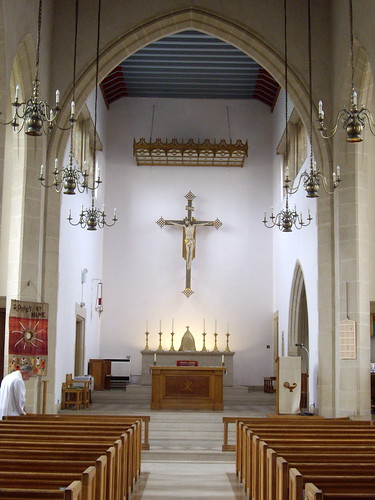
In
Christ the King the design of almost everything is to point towards
the sanctuary here, to first Christ on the cross dying for our
salvation, sacrificing Himself so that uniting Himself to our
suffering and death, we might be able to unite ourselves to His
rising and new life in His Resurrection. And here in this Church, we
see below the Crucifix, the Tabernacle of His Sacred Body. Here His
Resurrection Life is poured out in Grace in the Sacrament of His
Body. Here is the Altar of Christ, where His Sacrifice of Himself is
re-presented day after day, so that members of Christ's Church may
receive the Grace that Christ died on the Cross for. The people of
God, receiving the Grace of Christ, can then go out into the world,
in order to share the Good News of Salvation by their very lives.
This earthly building is so constructed so the people of God can
return regularly, because they need continually to repent of their
sins, to restore themselves to the life of grace, and to receive the
sacred body and precious blood once more, and then go out again.
The danger of being led astray is
very real. We are so easily attracted by human achievement that we
forget the awesome work of God. We neglect the wondrous truths of our
faith, and instead seek after human wisdom. Or we go after signs and
wonders, prophecies and predictions – again because they thrill us.
But where we should really be focused is the person of Jesus Christ,
true God and true Man; He alone is our salvation, and in Him alone
should we trust.
IH
16th
November 2013
